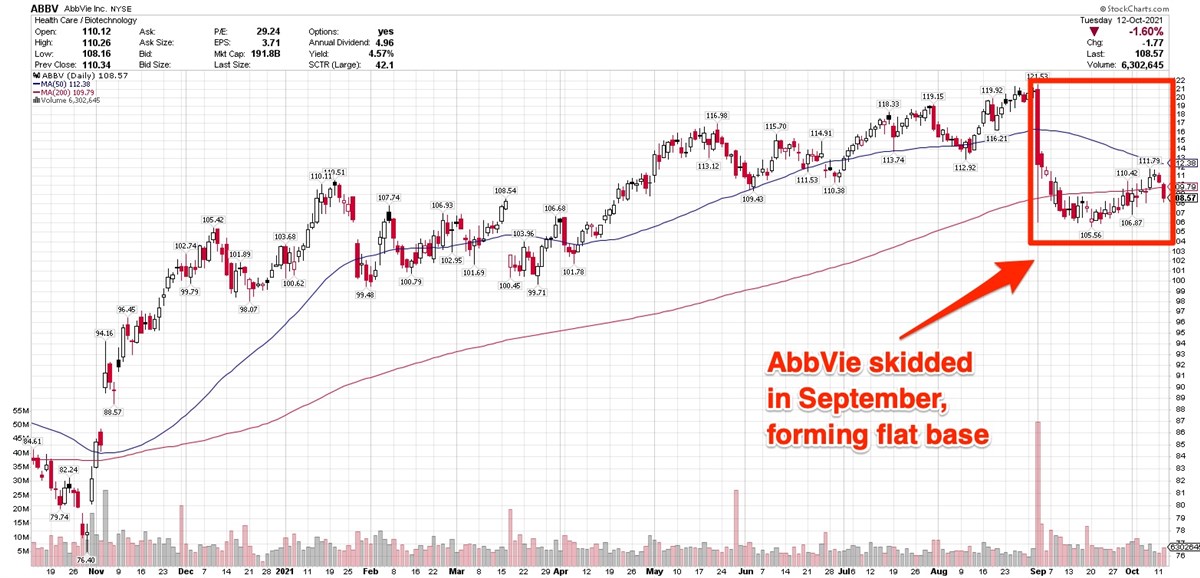After shares of pharmaceutical company
AbbVie NYSE: ABBV plummeted at the somewhat scary rate of 6.66% the week ended September 3, analysts began focusing on what caused the decline.
Since then, the stock hasn't managed to regain much-lost ground, but it's forming a flat base ahead of its third-quarter report on October 29.
Illinois-based AbbVie began trading as its own entity in 2013 after being split off from Abbott Laboratories. Abbott retained the medical products business, while AbbVie develops pharmaceutical products to treat conditions in the areas of immunology, oncology and virology, among others.
AbbVie continues to notch great earnings and analysts have fairly strong forecasts, so what happened to the stock in September? For the month, it was down 10.69%.
The skid centered around AbbVie's rheumatoid arthritis treatment Rinvoq. In early September, the FDA revised the warning language on Rinvoq packaging to include information about greater risks of serious and potentially fatal heart ailments, cancer and blood clots. The FDA is also restricting Rinvoq's use to patients who didn't find relief from a Tumor Necrosis Factor (TNF) Inhibitors, which control inflammation in the joints, skin and gastrointestinal tract.
Possible Revenue Decrease
Here's where a potential revenue problem occurs: If Rinvoq is used only after other treatments fail, it could mean a revenue decrease between $1 billion and $3 billion, according to a note by Geoffrey Porges at healthcare investment bank SVB Leerink.
Porges also lowered his price target from $148.00 to $142.00, according to MarketBeat's compilation of analyst actions.
Nonetheless, analysts still have a "buy" rating on the stock, with a consensus price target of $126.16, representing a 16.20% upside.
For the third quarter, analysts expect earnings per share of $3.23 on revenue of $14.43 billion. Those would be year-over-year increases on the top- and bottom lines.
For the full year, Wall Street pegged earnings at $12.61 per share, up 19%. For 2022, analysts expect earnings of $13.86 per share, a gain of another 10%. Both those numbers were revised lower recently.
If there is a dent in sales of Rinvoq, that could disrupt plans for growing a portfolio of top sellers outside its blockbuster drug Humira, whose patent expires in 2034. Early entry in 2023 is open to biosimilar manufacturers that AbbVie has struck settlements with.
Pre-pandemic, Humira, which treats Crohn's disease, was the best-selling pharmaceutical product of all time.
Picking Up Slack From Humira
So investors were reacting to the potential for lost revenue and lower earnings if Rinvoq can't pick up some of the slack from a Humira patent expiration.
AbbVie has a market capitalization of $191.76 billion. It joined the S&P 500 immediately upon being spun off from Abbott in 2013.
Prior to September's pullback, AbbVie had been making slow but steady progress this year when it comes to price appreciation. In fact, the stock is still up 6.62% year-to-date and 31.61% on a one-year basis.
Although future revenue and earnings growth are in question, revenue grew at double-digit rates in the past seven quarters, and earnings in seven of the pas eight quarters. AbbVie has been profitable since going public in 2013.
So what does this mean for AbbVie as a stock to buy? Despite the big pullback and the continued consolidation, there are still many positive aspects. The company released new data about Rinvoq last week, with the aim of boosting the drug's prospects.
A catalyst for another move either up or down may be the October 29 earnings report. At this juncture, with the stock still in a correction and earnings just a few weeks away, it's not worth trying to "buy the dip." While the sudden pullback shook out investors and looks steep on a chart, the stock has only corrected 13% from peak to trough so far.
While there's far too much potential for further surprises, in the long term, AbbVie still appears to have winning characteristics. This is a case where it's best to wait it out for now.

Before you consider AbbVie, you'll want to hear this.
MarketBeat keeps track of Wall Street's top-rated and best performing research analysts and the stocks they recommend to their clients on a daily basis. MarketBeat has identified the five stocks that top analysts are quietly whispering to their clients to buy now before the broader market catches on... and AbbVie wasn't on the list.
While AbbVie currently has a Moderate Buy rating among analysts, top-rated analysts believe these five stocks are better buys.
View The Five Stocks Here
Need to stretch out your 401K or Roth IRA plan? Use these time-tested investing strategies to grow the monthly retirement income that your stock portfolio generates.
Get This Free Report